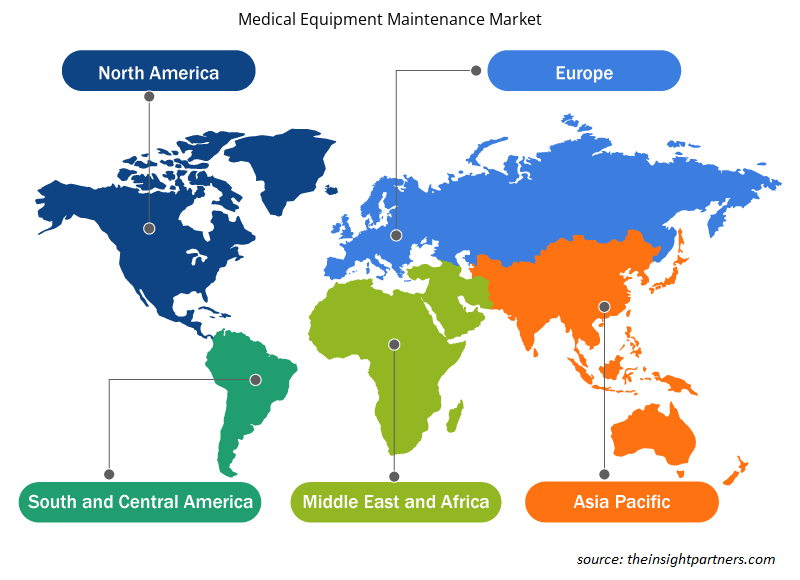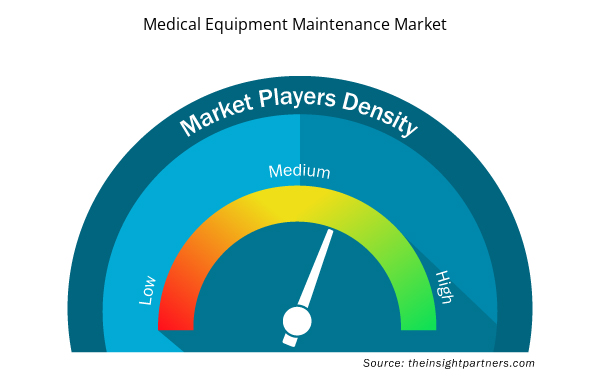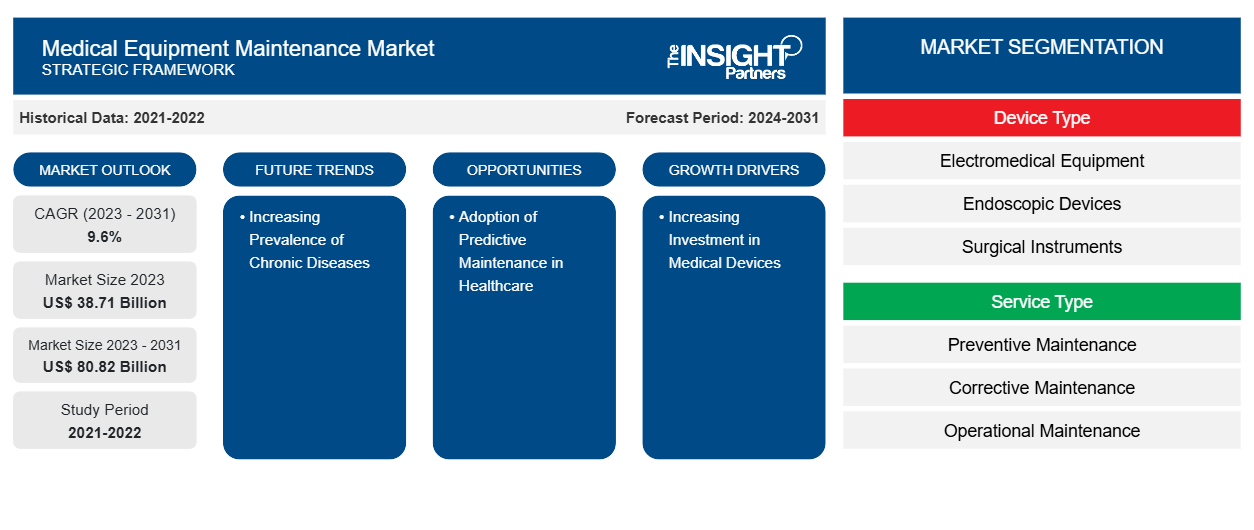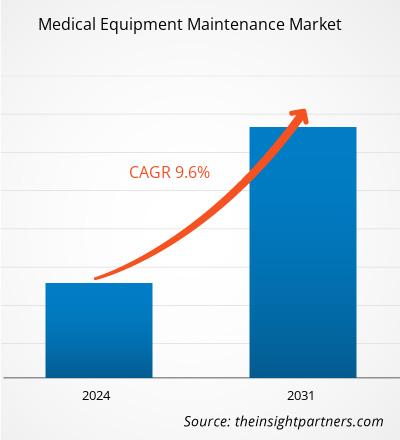Der Markt für die Wartung medizinischer Geräte belief sich 2023 auf 38,71 Milliarden US-Dollar und soll bis 2031 80,82 Milliarden US-Dollar erreichen. Es wird erwartet, dass der Markt zwischen 2023 und 2031 eine durchschnittliche jährliche Wachstumsrate von 9,6 % verzeichnet. Der technologische Fortschritt bei medizinischen und diagnostischen Geräten dürfte weiterhin ein wichtiger Trend auf dem Markt bleiben.
Marktanalyse zur Wartung medizinischer Geräte
Der weltweit schnell wachsende Markt für medizinische Geräte und die zunehmende Nutzung korrektiver Wartung treiben die Nachfrage nach Wartung medizinischer Geräte in die Höhe. Die zunehmende Verbreitung chronischer Krankheiten in der Bevölkerung trägt erheblich zur Nachfrage nach Wartung medizinischer Geräte bei. Innovationen bei Serviceangeboten und die Nutzung des IoT schaffen Chancen für den Markt für Wartung medizinischer Geräte.
Marktübersicht zur Wartung medizinischer Geräte
Auf dem Markt für die Wartung medizinischer Geräte decken Dienstleister ein breites Spektrum an Anforderungen ab, darunter die Reparatur langlebiger medizinischer Geräte und spezielle Dienstleistungen für Dialysezentren. Mit einem Schwerpunkt auf der Einhaltung gesetzlicher Vorschriften, einschließlich Krebs und Lebensstilstörungen, bieten Unternehmen Lösungen sowohl für OEMs mit mehreren als auch mit Einzelanbietern.
Passen Sie diesen Bericht Ihren Anforderungen an
Sie erhalten kostenlos individuelle Anpassungen an jedem Bericht, einschließlich Teilen dieses Berichts oder einer Analyse auf Länderebene, eines Excel-Datenpakets sowie tolle Angebote und Rabatte für Start-ups und Universitäten.
- Holen Sie sich die wichtigsten Markttrends aus diesem Bericht.Dieses KOSTENLOSE Beispiel umfasst eine Datenanalyse von Markttrends bis hin zu Schätzungen und Prognosen.
Treiber und Chancen auf dem Markt für die Wartung medizinischer Geräte
Steigende Investitionen in medizinische Geräte fördern das Marktwachstum
Die Gesundheitsbranche verzeichnet steigende Investitionen in medizinische Geräte wie Röntgengeräte, Zentrifugen, Beatmungsgeräte, Ultraschallgeräte, Spritzenpumpen, Elektrokardiographen und Autoklaven, was in erster Linie den Bedarf an Wartungsdiensten für medizinische Geräte erhöht. Die Wartung medizinischer Geräte ist unerlässlich, um sicherzustellen, dass sie ordnungsgemäß funktionieren und für den Patienten sicher verwendet werden können. Gesundheitseinrichtungen verlassen sich zunehmend auf Wartungsdienstleister, um ihre Geräte in gutem Betriebszustand zu halten und Ausfallzeiten zu reduzieren. Moderne medizinische Geräte müssen regelmäßig gewartet werden, um sicherzustellen, dass sie ordnungsgemäß funktionieren. Die Komplexität neuer medizinischer Geräte treibt die Nachfrage nach spezialisiertem Wartungswissen in die Höhe.
Einführung von Predictive Maintenance im Gesundheitswesen
Predictive Maintenance im Gesundheitswesen ist die proaktive Überwachung und Verwaltung medizinischer Geräte, um ungeplante Ausfallzeiten zu vermeiden und eine optimale Leistung sicherzustellen. Im Gegensatz zu herkömmlichen Wartungsmethoden, die auf festen Zeitplänen oder reaktiven Reaktionen auf Geräteausfälle beruhen, nutzt Predictive Maintenance Echtzeitdaten und prädiktive Analysen, um mögliche Schwierigkeiten vorherzusehen und Wartungsaufgaben nach Risiko und Kritikalität zu priorisieren. Gesundheitsorganisationen können von reaktiven zu proaktiven Wartungsmethoden wechseln, indem sie moderne Technologien wie Sensoren, Datenanalyse und maschinelles Lernen einsetzen. Dies senkt die Kosten, steigert die Effizienz und verbessert die Patientenversorgung.
Marktbericht zur Wartung medizinischer Geräte – Segmentierungsanalyse
Wichtige Segmente, die zur Ableitung der Marktanalyse für die Wartung medizinischer Geräte beigetragen haben, sind Gerätetyp, Servicetyp und Serviceanbieter.
- Basierend auf dem Gerätetyp ist der Markt für die Wartung medizinischer Geräte in elektromedizinische Geräte, endoskopische Geräte, chirurgische Instrumente und andere medizinische Geräte unterteilt. Das Segment elektromedizinische Geräte hatte im Jahr 2023 den größten Marktanteil.
- Nach Servicetyp ist der Markt in vorbeugende Wartung, korrektive Wartung und betriebliche Wartung segmentiert. Das Segment der vorbeugenden Wartung hatte im Jahr 2023 den größten Marktanteil.
- In Bezug auf die Dienstleister ist der Markt in Erstausrüster, unabhängige Serviceorganisationen und Eigenwartung segmentiert. Das Segment der Erstausrüster hielt im Jahr 2023 den größten Marktanteil.
Marktanteilsanalyse für die Wartung medizinischer Geräte nach geografischer Lage
Der geografische Umfang des Marktberichts zur Wartung medizinischer Geräte ist hauptsächlich in fünf Regionen unterteilt: Nordamerika, Asien-Pazifik, Europa, Naher Osten und Afrika sowie Süd- und Mittelamerika.
Nordamerika dominiert den Markt. Die alternde Bevölkerung der Region und die steigenden Gesundheitskosten haben den Bedarf an Wartung und Kundendienst für medizinische Geräte über die Jahre hinweg hoch gehalten. Darüber hinaus haben strenge Gesetze zu Qualitätsstandards und Sicherheitsverfahren dafür gesorgt, dass die Gerätewartung sowohl für kommerzielle als auch für öffentliche Gesundheitseinrichtungen weiterhin ein Schwerpunkt bleibt.
Regionale Einblicke in den Markt für die Wartung medizinischer Geräte
Die regionalen Trends und Faktoren, die den Markt für die Wartung medizinischer Geräte während des Prognosezeitraums beeinflussen, wurden von den Analysten von Insight Partners ausführlich erläutert. In diesem Abschnitt werden auch Marktsegmente und Geografien für die Wartung medizinischer Geräte in Nordamerika, Europa, im asiatisch-pazifischen Raum, im Nahen Osten und Afrika sowie in Süd- und Mittelamerika erörtert.

- Erhalten Sie regionale Daten zum Markt für die Wartung medizinischer Geräte
Umfang des Marktberichts zur Wartung medizinischer Geräte
| Berichtsattribut | Details |
|---|---|
| Marktgröße im Jahr 2023 | 38,71 Milliarden US-Dollar |
| Marktgröße bis 2031 | 80,82 Milliarden US-Dollar |
| Globale CAGR (2023 - 2031) | 9,6 % |
| Historische Daten | 2021-2022 |
| Prognosezeitraum | 2024–2031 |
| Abgedeckte Segmente | Nach Gerätetyp
|
| Abgedeckte Regionen und Länder | Nordamerika
|
| Marktführer und wichtige Unternehmensprofile |
|
Dichte der Marktteilnehmer für die Wartung medizinischer Geräte: Auswirkungen auf die Geschäftsdynamik verstehen
Der Markt für die Wartung medizinischer Geräte wächst rasant. Dies wird durch die steigende Nachfrage der Endnutzer aufgrund von Faktoren wie sich entwickelnden Verbraucherpräferenzen, technologischen Fortschritten und einem größeren Bewusstsein für die Vorteile des Produkts vorangetrieben. Mit der steigenden Nachfrage erweitern Unternehmen ihr Angebot, entwickeln Innovationen, um die Bedürfnisse der Verbraucher zu erfüllen, und nutzen neue Trends, was das Marktwachstum weiter ankurbelt.
Die Marktteilnehmerdichte bezieht sich auf die Verteilung von Firmen oder Unternehmen, die in einem bestimmten Markt oder einer bestimmten Branche tätig sind. Sie gibt an, wie viele Wettbewerber (Marktteilnehmer) in einem bestimmten Marktraum im Verhältnis zu seiner Größe oder seinem gesamten Marktwert präsent sind.
Die wichtigsten Unternehmen auf dem Markt für die Wartung medizinischer Geräte sind:
- Stryker
- Boston Scientific
- Medtronic
- Edward Lebenswissenschaften
- Johnson & Johnson
- Abbott
Haftungsausschluss : Die oben aufgeführten Unternehmen sind nicht in einer bestimmten Reihenfolge aufgeführt.

- Überblick über die wichtigsten Akteure auf dem Markt für die Wartung medizinischer Geräte
Neuigkeiten und aktuelle Entwicklungen zum Markt für die Wartung medizinischer Geräte
Der Markt für die Wartung medizinischer Geräte wird durch die Erhebung qualitativer und quantitativer Daten nach Primär- und Sekundärforschung bewertet, die wichtige Unternehmensveröffentlichungen, Verbandsdaten und Datenbanken umfasst. Nachfolgend sind einige der Entwicklungen auf dem Markt für die Wartung medizinischer Geräte aufgeführt:
- B. Braun Thailand hat das „B. Braun Technical Service Center“ eingeweiht, das hochwertige Reparatur- und Wartungsdienste für medizinische Geräte anbieten wird. Das neu eröffnete Zentrum soll das öffentliche Gesundheitssystem Thailands unterstützen und sicherstellen, dass es seinen Bürgern eine nahtlose Gesundheitsversorgung bieten kann. (Quelle: B. Braun SE, Pressemitteilung, Juli 2022)
Marktbericht zur Wartung medizinischer Geräte – Umfang und Ergebnisse
Der Bericht „Marktgröße und Prognose für die Wartung medizinischer Geräte (2021–2031)“ bietet eine detaillierte Analyse des Marktes, die die folgenden Bereiche abdeckt:
- Marktgröße und Prognose zur Wartung medizinischer Geräte auf globaler, regionaler und Länderebene für alle wichtigen Marktsegmente, die im Rahmen des Berichts abgedeckt sind
- Markttrends und Marktdynamiken für die Wartung medizinischer Geräte wie Treiber, Einschränkungen und wichtige Chancen
- Detaillierte PEST/Porters Five Forces- und SWOT-Analyse
- Marktanalyse zur Wartung medizinischer Geräte, die wichtige Markttrends, globale und regionale Rahmenbedingungen, wichtige Akteure, Vorschriften und aktuelle Marktentwicklungen umfasst
- Branchenlandschaft und Wettbewerbsanalyse, einschließlich Marktkonzentration, Heatmap-Analyse, prominenten Akteuren und aktuellen Entwicklungen auf dem Markt für die Wartung medizinischer Geräte
- Detaillierte Firmenprofile
- Historische Analyse (2 Jahre), Basisjahr, Prognose (7 Jahre) mit CAGR
- PEST- und SWOT-Analyse
- Marktgröße Wert/Volumen – Global, Regional, Land
- Branche und Wettbewerbsumfeld
- Excel-Datensatz



Report Coverage
Revenue forecast, Company Analysis, Industry landscape, Growth factors, and Trends

Segment Covered
This text is related
to segments covered.

Regional Scope
North America, Europe, Asia Pacific, Middle East & Africa, South & Central America

Country Scope
This text is related
to country scope.
Häufig gestellte Fragen
North America dominated the market in 2023.
Increasing investment in medical devices and increasing prevalence of chronic diseases are the factors driving the market.
Technological advancement in medical and diagnostics equipment is likely to act as future trends in the market.
Stryker, Boston Scientific, Medtronic, Edward Lifesciences, Johnson & Johnson, Abbott, Terumo Corporation, B. Braun Melsungen Ag, Aramark Services Inc., and Althea are the leading players operating in the medical equipment maintenance market.
The estimated value of the market by 2031 will be US$ 80.82 billion.
The market is estimated to grow at a CAGR of 9.6% during 2023–2031.
Trends and growth analysis reports related to Life Sciences : READ MORE..
The Insight Partners performs research in 4 major stages: Data Collection & Secondary Research, Primary Research, Data Analysis and Data Triangulation & Final Review.
- Data Collection and Secondary Research:
As a market research and consulting firm operating from a decade, we have published and advised several client across the globe. First step for any study will start with an assessment of currently available data and insights from existing reports. Further, historical and current market information is collected from Investor Presentations, Annual Reports, SEC Filings, etc., and other information related to company’s performance and market positioning are gathered from Paid Databases (Factiva, Hoovers, and Reuters) and various other publications available in public domain.
Several associations trade associates, technical forums, institutes, societies and organization are accessed to gain technical as well as market related insights through their publications such as research papers, blogs and press releases related to the studies are referred to get cues about the market. Further, white papers, journals, magazines, and other news articles published in last 3 years are scrutinized and analyzed to understand the current market trends.
- Primary Research:
The primarily interview analysis comprise of data obtained from industry participants interview and answers to survey questions gathered by in-house primary team.
For primary research, interviews are conducted with industry experts/CEOs/Marketing Managers/VPs/Subject Matter Experts from both demand and supply side to get a 360-degree view of the market. The primary team conducts several interviews based on the complexity of the markets to understand the various market trends and dynamics which makes research more credible and precise.
A typical research interview fulfils the following functions:
- Provides first-hand information on the market size, market trends, growth trends, competitive landscape, and outlook
- Validates and strengthens in-house secondary research findings
- Develops the analysis team’s expertise and market understanding
Primary research involves email interactions and telephone interviews for each market, category, segment, and sub-segment across geographies. The participants who typically take part in such a process include, but are not limited to:
- Industry participants: VPs, business development managers, market intelligence managers and national sales managers
- Outside experts: Valuation experts, research analysts and key opinion leaders specializing in the electronics and semiconductor industry.
Below is the breakup of our primary respondents by company, designation, and region:

Once we receive the confirmation from primary research sources or primary respondents, we finalize the base year market estimation and forecast the data as per the macroeconomic and microeconomic factors assessed during data collection.
- Data Analysis:
Once data is validated through both secondary as well as primary respondents, we finalize the market estimations by hypothesis formulation and factor analysis at regional and country level.
- Macro-Economic Factor Analysis:
We analyse macroeconomic indicators such the gross domestic product (GDP), increase in the demand for goods and services across industries, technological advancement, regional economic growth, governmental policies, the influence of COVID-19, PEST analysis, and other aspects. This analysis aids in setting benchmarks for various nations/regions and approximating market splits. Additionally, the general trend of the aforementioned components aid in determining the market's development possibilities.
- Country Level Data:
Various factors that are especially aligned to the country are taken into account to determine the market size for a certain area and country, including the presence of vendors, such as headquarters and offices, the country's GDP, demand patterns, and industry growth. To comprehend the market dynamics for the nation, a number of growth variables, inhibitors, application areas, and current market trends are researched. The aforementioned elements aid in determining the country's overall market's growth potential.
- Company Profile:
The “Table of Contents” is formulated by listing and analyzing more than 25 - 30 companies operating in the market ecosystem across geographies. However, we profile only 10 companies as a standard practice in our syndicate reports. These 10 companies comprise leading, emerging, and regional players. Nonetheless, our analysis is not restricted to the 10 listed companies, we also analyze other companies present in the market to develop a holistic view and understand the prevailing trends. The “Company Profiles” section in the report covers key facts, business description, products & services, financial information, SWOT analysis, and key developments. The financial information presented is extracted from the annual reports and official documents of the publicly listed companies. Upon collecting the information for the sections of respective companies, we verify them via various primary sources and then compile the data in respective company profiles. The company level information helps us in deriving the base number as well as in forecasting the market size.
- Developing Base Number:
Aggregation of sales statistics (2020-2022) and macro-economic factor, and other secondary and primary research insights are utilized to arrive at base number and related market shares for 2022. The data gaps are identified in this step and relevant market data is analyzed, collected from paid primary interviews or databases. On finalizing the base year market size, forecasts are developed on the basis of macro-economic, industry and market growth factors and company level analysis.
- Data Triangulation and Final Review:
The market findings and base year market size calculations are validated from supply as well as demand side. Demand side validations are based on macro-economic factor analysis and benchmarks for respective regions and countries. In case of supply side validations, revenues of major companies are estimated (in case not available) based on industry benchmark, approximate number of employees, product portfolio, and primary interviews revenues are gathered. Further revenue from target product/service segment is assessed to avoid overshooting of market statistics. In case of heavy deviations between supply and demand side values, all thes steps are repeated to achieve synchronization.
We follow an iterative model, wherein we share our research findings with Subject Matter Experts (SME’s) and Key Opinion Leaders (KOLs) until consensus view of the market is not formulated – this model negates any drastic deviation in the opinions of experts. Only validated and universally acceptable research findings are quoted in our reports.
We have important check points that we use to validate our research findings – which we call – data triangulation, where we validate the information, we generate from secondary sources with primary interviews and then we re-validate with our internal data bases and Subject matter experts. This comprehensive model enables us to deliver high quality, reliable data in shortest possible time.


 Holen Sie sich ein kostenloses Muster für diesen Bericht
Holen Sie sich ein kostenloses Muster für diesen Bericht